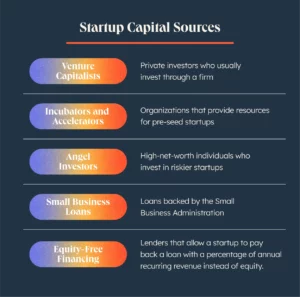In this article, I will answer some common questions we get from people who are in the earliest stages of building a startup. I’ll cover some key things to consider when starting out, break down what Evergreen looks for when evaluating companies, and then dive into the resources out there that can help you be successful.
What should potential founders think about?
Before you take the leap, think long and hard about whether you want to do this. Founding a startup that will likely require millions of dollars of invested capital is a monumental undertaking and 90% of new startups will end up failing. Be sure to ask yourself: why are you doing this?
If you just want to be your own boss, don’t do it. You could instead launch a consulting firm, brick-and-mortar store, or other “lifestyle company” and have a much higher likelihood of success, while still getting to have your own business.
Founding a startup is the right decision if you have the ability or the technology to solve a big problem and tackle a huge opportunity and you don’t think anyone else has that. If you vehemently believe that, and if not doing it is eating away at you, you have no choice but to go all in.
What does Evergreen think about when evaluating companies?
Evergreen reviews hundreds of startups each year. Some of the top things that we consider are the value proposition, market opportunity, technology, team, financials, and potential climate impact.
- Value Proposition – How effectively does this solution solve the problem for customers? Ideally you can quantify the value prop: how much faster/better/cheaper is your solution?
- Market – Is this a huge market opportunity? How difficult will it be to sell into this market? What trends are shaping the future of this market?
- Technology – How unique is your technology? Is it defensible? What is your competitive advantage?
- Team – Is this the right team? Is there a strong “founder-market fit”? Is the team capable of commercializing the technology and getting market traction?
- Financials – What are your unit economics? For early-stage, pre-revenue startups, the unit economics typically help demonstrate the strength of the value prop, whereas forward-looking financial projections are almost always overly optimistic, though they do help paint a picture of the founders’ vision and expectations. Focus on capturing a high-profit margin by creating a lot of value in the market and capturing a significant share of that value.
- Unit economics = price per unit – cost of goods sold (“COGS”)
- Potential Climate Impact – What is the climate impact that this solution could deliver to the world at scale? At Evergreen, we believe that meaningful environmental impact can only be achieved if a business is able to successfully scale.
What are some other things investors look for?
As you are beginning to fundraise and pitch investors, be sure to research their interests and motivations. Some investors may be motivated by a potential issue or cause, desire a rapid return on their investment, or be willing to wait for a bigger payout. Do your diligence on your investors before you pitch them and tailor your pitch to their interests.
Also, remember that even companies that successfully fundraise hear “no” a lot. If an investor passes on your business, that’s not a value judgment on you as a person; your company might just not be a good sector or stage fit for that investor.
When you are trying to fundraise, remember to consider your business from the perspective of the investor. The investor is, among other things, trying to answer “how will this investment create value in the business?” What will this round enable you to achieve? Ideally, this includes milestones that represent inflection points in how the company will be valued, so that if you are fundraising in the future, you can both show progress and also raise additional capital at a higher valuation.
Demystifying Startup Capital Sources
Startup funding is categorized as either dilutive or non-dilutive. Dilutive funding is any funding for which you give up some ownership of the company through equity or other securities like convertible notes or SAFEs (by giving up some equity, you dilute your share of the business). Non-dilutive funding is any funding that doesn’t require you to give up equity.
Dilutive Funding
This includes funding from venture capital funds (VCs), friends and family, and angel investors.
The major distinction between angel investors and VCs is that angels usually invest their own money whereas VCs are investing other people’s money (Limited Partners). VCs are typically motivated by the desire to provide a strong competitive return over a specific time period to the investors in their fund. The better the VCs do for those LPs, the better they do personally. Angel investors are typically investing their own money and, beyond financial returns, may have additional motivations such as wanting to provide mentorship to entrepreneurs, support their local community, or invest in businesses with a strong social impact. Angel investors also typically invest earlier than VCs, although there is some overlap. Some angel investors invest individually, while others invest as part of angel groups or syndicates.
Friends and family are also a common source of early-stage financing to kick-start their company. Visible.vc has a helpful blog post that demystifies the friends and family round. A friends and family round is typically the first funding a company raises before they raise venture dollars.
There are also other ecosystem entities such as university commercialization funds and accelerators, some of which act as early investors in startups.
Climate Tech VC has a great running list of climate tech VCs to help you get started.
Non-Dilutive Funding
Government agencies such as DOE, NSF, and DoD provide many grant funding opportunities for startups to take advantage of. The Small Business Innovation Research (SBIR) and Small Business Technology Transfer (STTR) programs are two common sources of non-dilutive funding for startups in our portfolio. There are also prizes, competitions, and non-dilutive debt options (although they can be hard to come by at an early stage). The Clean Energy Business Network has a very robust database full of clean tech funding resources that are available.
A lot of entrepreneurs get distracted by the non-dilutive options out there, but it’s nice to have a balance of both non-dilutive and dilutive funding. Dilutive funding on your cap table can be a good thing – those investors have skin in the game and can be very impactful. Remember that their success is your success.

Credit: HubSpot for Startups
Support Beyond Funding
There are many incubators, accelerators, and programs out there that want to help you, so be sure to take advantage of them! Check out the Heartland Climate Tech Partnership website to see some of the many resources out there.
Some factors to consider when choosing a program include: duration, cohort structure, selection process, venture stage, program offerings (curriculum, mentorship, network), differentiation/value prop, location, time commitment, whether funding is included, and if the program takes equity.
Common Types of Programs & Examples:
- Accelerators – Support early-stage start-up businesses through short-term training and mentorship aimed at rapid growth. These are cohort-based with a fixed duration: typically 12 weeks to 6 months. Startups typically receive an equity investment ($100k-150k for 5-7% equity is common).
- Incubators – Rents physical space and offers consultations with experts for startups, but with limited training programs and content. Open-ended duration, typically rent-based revenue model. Offers office and/or specific facilities, in-person educational events and/or social events, and access to free or discounted legal and business services.
- Science and Innovator Fellowships – Supports technical founders commercializing new technology innovations. These are typically 2-year programs with a stipend for living expenses; many have strong partnerships with access to national labs.

Source: Accelerate This!
Advice for Students
We recommend that students plug into your entrepreneurial center, business school, or tech transfer office at your university. Those entities will likely have additional resources available for students who want to start a company, and may also underwrite business plan competitions for students at the school, which offer an opportunity to refine your business and win cash prizes, like the University of Chicago’s New Venture Challenge. Other universities like CMU and UW-Madison have entire institutes dedicated to energy research and innovation.
There are also plenty of business plan competitions that are open to students from anywhere in the United States, including the Department of Energy’s EnergyTech University Prize, Rice Business Plan Competition, and the MIT Climate and Energy Prize.
Where Evergreen Fits In
Evergreen invests in early-stage, climate tech startups across the Greater Midwest region. If you are building a company that addresses climate mitigation, resilience, or natural resource conservation and are looking for pre-seed or seed funding, apply for investment today.
We wish you the best of luck as you begin your startup journey!
Allie Gross is a Program Manager at Evergreen Climate Innovations managing the execution, reporting, and success of key programs and developing new platform support for Evergreen’s portfolio companies. Prior to working at Evergreen, Allie worked at a data management startup and at a climate tech accelerator.
This blog post was inspired by a conversation between Evergreen Managing Directors Ian Adams & Paul Seidler during EnergyTech UP 2022. You can check out the recording here!